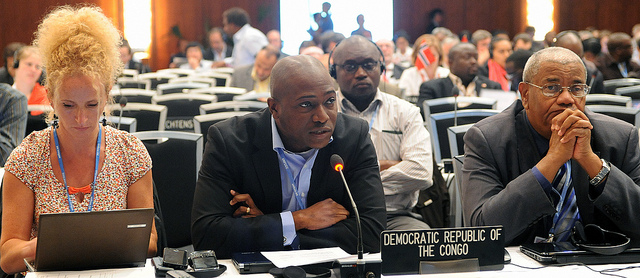
Ahead of the forthcoming international climate meeting in Bonn from 16-26 May 2016, the Least Developed Countries (LDC) Group has called for concerted actions aimed at ensuring the early entry into force of the Paris Agreement.
The Bonn meeting follows the adoption of a new global agreement on climate change in Paris in December, 2015. Parties will now begin negotiating how they will reach the goals set down in Paris.
International negotiators will convene in Bonn, Germany, for a meeting which comes at a critical point in global climate change negotiations. The Bonn conference is the first meeting of Parties to the UNFCCC since the historic adoption by 195 countries of the Paris Agreement on climate change in December, 2015.
The Paris climate change conference was a significant political achievement and seen as a turning point in global efforts to address climate change. Political momentum was further strengthened on 22 April 2016, with 175 Parties signing the Paris Agreement in New York in preparation for the treaty entering into force.
In the lead up to this important meeting, Chair of the LDC Group Tosi Mpanu-Mpanu believes that “reaching global agreement in Paris does not mean we can become complacent. We have drawn the blueprint and we must now begin construction of the rules and procedures that will bring the next phase of our global climate regime to life. A record-breaking 175 Parties united in New York on April 22 to sign the Paris Agreement, demonstrating that we have the political momentum to achieve this.”
The LDC Group aspires to build on current political momentum by continuing the push for early entry into force of the Paris Agreement, so that the world can benefit as soon as possible from its implementation.
“Even if current pledges are fulfilled, the world is on a path to over 3 degrees C of warming, well above the global goal of 1.5 degrees set in Paris; and that is without considering that developing countries need support to the tune of $4tn to meet these pledges,” the Group said.
On the issue of climate finance, Tosi Mpanu Mpanu said: “The least developed countries are the least responsible for climate change, with developed countries bearing both the historic responsibility and the capacity to respond. Public finance to support developing countries needs to rise to meet the challenge that lies before us.”
Restating the importance of adaption, the LDC Group Chair stated that “the earth’s oceans are rising, disease is spreading, our land is no longer producing the food we need to survive. The world must adapt to meet the unavoidable impacts of climate change head on, or face the consequences.”
Tosi Mpanu-Mpanu also emphasised the necessity of pre-2020 action: “We cannot sit idly waiting for the Paris Agreement to commence, the window of opportunity to act on climate change is closing. We must harness the power of fresh global cooperation to strengthen pre-2020 action.”
For developing countries, and in particular the Least Developed Countries (LDCs), Bonn is an important opportunity to advance discussions on the financial, technical and capacity building support to implement their obligations under the Paris Agreement and adapt to the adverse impacts of climate change.
As the poorest countries in the world, the LDCs are the most vulnerable to the impacts of climate change, yet have done the least to cause the problem. As such, the LDC group is committed to working with the international community to urgently cut emissions and prepare and respond to climate impacts.
LDCs
The Least Developed Countries are 48 nations that are especially vulnerable to climate change but have done the least to cause the problem.
They work together at the intergovernmental negotiations under the UN Framework Convention on Climate Change with two aims. First, to demand that wealthier nations act in accordance with their responsibility for creating the problem and their capability for addressing it. Second, to play a leadership role in global efforts to prevent dangerous climate change.











